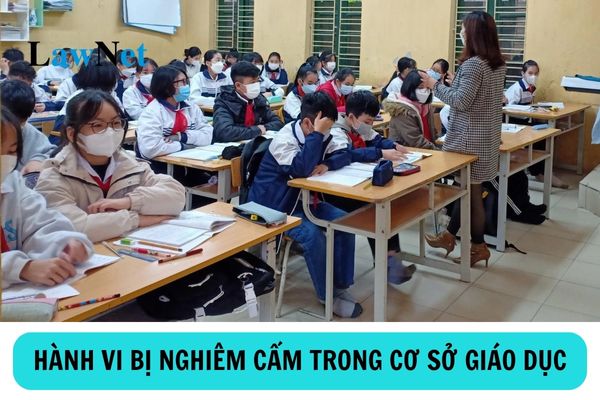What are the prohibited acts in educational institutions in Vietnam?
What are the prohibited acts in educational institutions in Vietnam?
According to Article 22 of the Education Law 2019, the prohibited behaviors in educational institutions include:
- Insulting the dignity, honor, or infringing on the body of teachers, staff, employees of the educational institution, and learners.
- Distorting educational content.
- Cheating in studying, testing, exams, or admissions.
- Smoking; drinking alcohol or beer; disturbing public order and security.
- Forcing students to take extra classes for profit.
- Exploiting sponsorship and support for education to coerce monetary or material contributions.

What are the prohibited acts in educational institutions in Vietnam? (Image from the Internet)
What are the regulations on educational programs in educational institutions in Vietnam?
Based on Article 8 of the Education Law 2019, the educational program is regulated as follows:
- The educational program reflects educational goals; stipulates standards of knowledge, skills, and requirements to be achieved regarding the qualities and abilities of learners; scope and structure of educational content; methods and forms of organizing educational activities; ways to evaluate educational outcomes for each subject at each grade, each level, or subjects, modules, disciplines for each training level.
- The educational program must ensure scientific and practical nature; continuity and connection among educational levels, training levels; facilitate streaming and transfer between training levels, disciplines, and forms of education within the national educational system to allow localities and educational institutions to actively implement appropriate educational plans; meet the goals of gender equality and international integration. The educational program is the basis for ensuring comprehensive educational quality.
- Standards of knowledge, skills, and requirements to be achieved regarding the qualities and abilities of learners defined in the educational program must be specified in textbooks for general education; syllabi and teaching materials for vocational education and higher education. Textbooks, syllabi, and teaching materials must meet educational method requirements.
- The educational program is implemented according to the academic year for preschool and general education; by academic-year system or cumulative modules or credits or a combination of credits and academic-year system for vocational education and higher education.
The learning outcomes of subjects or credits, modules accumulated by learners in one educational program are recognized to consider their value for transfer to corresponding courses or credits, modules in another educational program when learners change disciplines, training methods, or ascend to higher educational levels.
- The Minister of Education and Training and the Minister of Labor, Invalids and Social Affairs, within their duties and powers, prescribe the implementation of the educational program and the recognition of the transfer value of learning outcomes in education levels defined in Article 8 of the Education Law 2019.
What languages are used in educational institutions in Vietnam?
Based on Article 11 of the Education Law 2019, the language used in educational institutions is regulated as follows:
Language and Writing used in Educational Institutions
- Vietnamese is the official language used in educational institutions. Based on educational goals and specific requirements of educational content, the Government of Vietnam stipulates the teaching and learning in foreign languages in educational institutions.
- The State encourages and creates conditions for ethnic minorities to learn their languages and scripts as prescribed by the Government of Vietnam; persons with hearing and speaking disabilities to learn sign language, and visually impaired persons to learn Braille as prescribed by the Law on Persons with Disabilities.
- Foreign languages stipulated in the educational program are languages commonly used in international transactions. The organization of foreign language teaching in educational institutions must ensure continuous and effective learning for learners.
Thus, the languages used in educational institutions include Vietnamese, foreign languages, ethnic minority languages, sign language, and Braille.
What are the objectives of education in Vietnam?
Based on Article 2 of the Education Law 2019, the objectives of education are:
- To fully develop Vietnamese people with ethics, knowledge, culture, health, aesthetics, and professions; with qualities, abilities, and civic awareness; with patriotism, national spirit, loyalty to the ideals of national independence and socialism;
- To bring into play the potential and creativity of each individual; to improve people's intellectual standards, develop human resources, nurture talents, meet the requirements of national construction, protection, and international integration.

